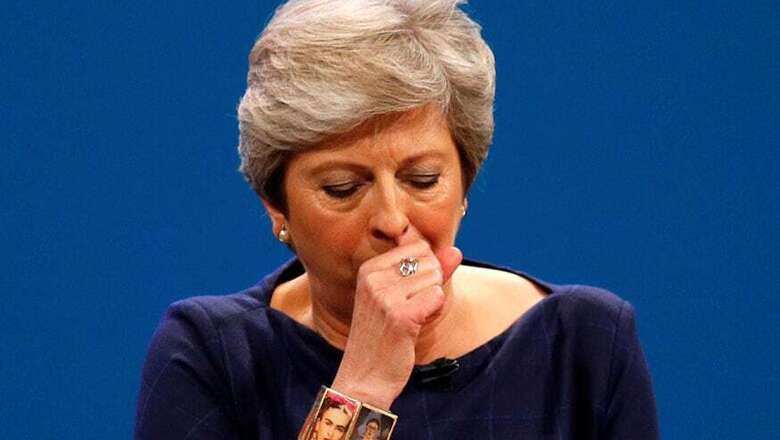
views
London: UK Prime Minister Theresa May on Friday announced that she will resign as leader of the Conservative party on Friday 7. June. The end of May's premiership will usher in an even more turbulent phase of Britain's exit from the European Union as any new leader is likely to seek to strike a tougher divorce deal, and there could be an election within months.
Ultimately, the United Kingdom will either leave with a transition deal of some kind to smooth its way out, leave abruptly without a deal, or not leave at all. Another delay is likely.
Boris Johnson, the face of the official Brexit campaign in 2016 and the bookmakers' favourite to succeed May, wants a harder divorce than May was proposing. Other top candidates for the job are Sajid Javid, Michael Gove and Jeremy Hunt.
Opposition Labour Party leader Jeremy Corbyn wants to implement a range of classic socialist policies. He voted against EU membership in 1975, gave only reluctant backing to the 2016 campaign to remain in the EU, and has signalled only lukewarm backing for another referendum.
1) 'NO-DEAL' BREXIT
Whoever succeeds May as Conservative Party leader will almost certainly have to demand a tougher Brexit deal from Brussels - yet the EU has repeatedly said it will not rework the Withdrawal Treaty.
That means a confrontation of some kind with the bloc before the scheduled departure date of Oct. 31.
To strengthen the hand of a future prime minister, some ministers want to step up preparations for a no-deal exit.
This is the nightmare scenario for many big businesses; by stripping the world's fifth-largest economy of many foreign trade relationships at one stroke, it would dislocate supply chains across Europe and beyond.
The political and social impact is unclear but, judging by past behaviour, financial markets would be spooked and sterling would fall.
While parliament has repeatedly demonstrated its opposition to a no-deal Brexit, it is unclear how it could actually be blocked if the government was intent on it.
"Parliamentary procedure offers no route, and the only apparent way to blocking 'no deal' – a vote of no confidence – would be a massive gamble for (Conservative members of parliament)," wrote the non-aligned Institute of Government.
The U.S. investment bank JPMorgan has raised its probability of a no-deal Brexit to 25%, saying its base case is that Boris Johnson will become prime minister, followed by a parliamentary election. In a research note to clients titled "Brexit: Time to be afraid, as 'no deal' probability rises", it put the likelihood of a delay to Britain's divorce date at 60%.
BNP Paribas said on Thursday it now saw a 40% probability of a no-deal Brexit, up from 20% before.
2) ELECTION
Britain's next national election is not due until 2022, but there are two ways a vote can be called sooner:
- Two-thirds of parliament's 650 lawmakers vote in favour.
- A motion of no confidence in the government is passed by a simple majority of lawmakers, and no party succeeds in winning the confidence of the House of Commons within 14 days.
The outcome of an election would be unpredictable as both major parties are losing support to smaller parties such as Nigel Farage's Brexit Party, the Liberal Democrats, the Scottish Nationalist Party and the Greens.
A Conservative majority government would be likely to implement a more decisive split from the EU; a Labour majority government would try to nationalise a number of strategic firms; or there could be a minority or coalition government.
3) NO BREXIT
May's impending departure will, within Britain, reset the debate about how exactly to leave the EU. But it will also give time for opponents of the divorce to push for a new referendum or even a revocation of the 'Article 50' divorce notification.
After years of saying she opposed another referendum, May's final gambit was to dangle the possibility of a second vote and closer trading arrangements.
One route is through a Labour victory at an election; while Corbyn has talked vaguely about a 'confirmatory referendum', his party is clear it wants a second vote.
Another is via parliament; in a power vacuum, lawmakers could simply vote for one, although the proposal has fallen short of a majority in previous votes.
If parliament did decide to hold another EU referendum, Britain would have to ask for its departure date to be put back from the end of October to allow enough time for a campaign.
Both sides of the Brexit divide are preparing for the possibility of another referendum, but it is far from clear how Britons would vote. If there were a majority for staying in the EU, Brexit supporters might demand a third and decisive vote.
4) NEW DEAL?
Any new prime minister facing a remaining bloc that has seven times the population of Britain would find it extremely hard to negotiate an entirely new deal, especially after May spent over two years negotiating her agreement.
The EU is ready to rework the Political Declaration on bilateral ties after Brexit, but not the legally binding Withdrawal Treaty - the part of the settlement that contains the Irish border 'backstop' arrangement, which undermined May's deal.
In April, French President Emmanuel Macron argued against a one-year Brexit extension, saying it was too risky for EU institutions, though German Chancellor Angela Merkel has repeatedly sought to avert a disorderly departure, which would be certain to hurt the European economy.




















Comments
0 comment